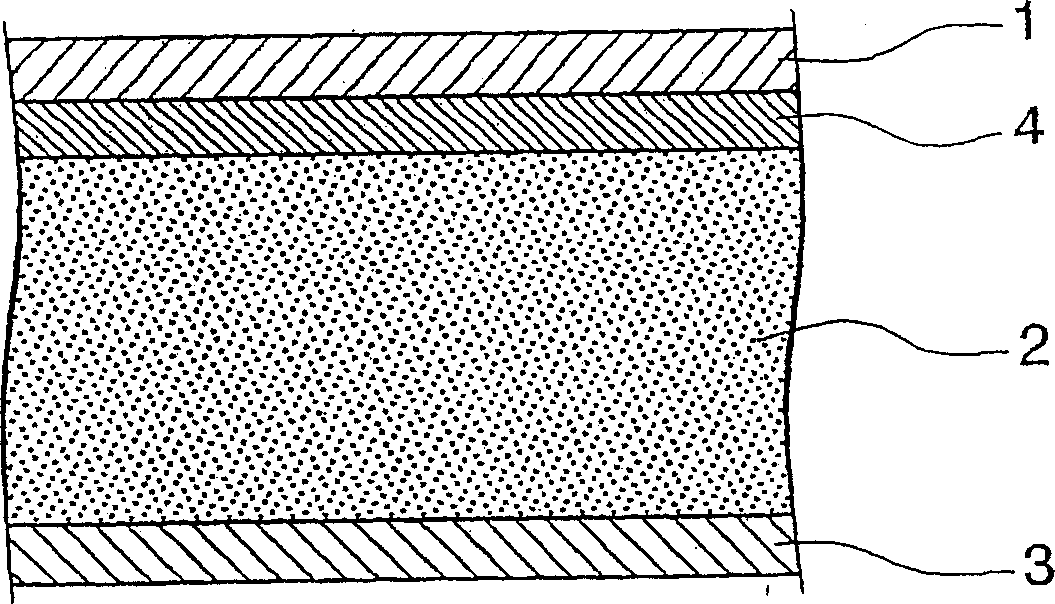Manufacturing process of polyurethane foam sheet and layered sheet using the same
A manufacturing method, foam technology, applied in the direction of chemical instruments and methods, lamination, layered products, etc.
- Summary
- Abstract
- Description
- Claims
- Application Information
AI Technical Summary
Problems solved by technology
Method used
Image
Examples
Embodiment 1
[0193] Production of foam sheet I
[0194] In a 1-liter four-necked flask, 70 parts of polytetramethylene glycol (hereinafter referred to as PTMG) with a number average molecular weight of 1300, and adipic acid (referred to as AA in Table 1) and hexanediol ( In Table 1, 30 parts of polyester polyols having a number average molecular weight of 2000 obtained by HG) reaction were heated under reduced pressure at 120° C., and dehydrated until the water content dropped to 0.05%. After cooling to 60°C, add 25 parts of 4,4'-diphenylmethane diisocyanate (MDI), heat up to 110°C, and react for 2 hours until the content of isocyanate groups is constant, thereby obtaining urethane prepolymer I.
[0195] The melt viscosity of the urethane prepolymer I at 125° C. was 8000 mPa·s, and the isocyanate group content was 2.1% by weight. Heat the urethane prepolymer I to 120° C. and mix and stir ethylene glycol (EG), N, N-dimethylcyclohexylamine (hereinafter referred to as DMCHA, Made by Aerodac...
Embodiment 2
[0199] Production of Foam Sheet II
[0200] The liquid mixture I obtained in Example 1 is directly introduced between the first release paper and the second release paper installed on the roller coater, and is coated into a sheet with a thickness of 100 μm, and then from the first release paper and the second release paper On both sides of the second release paper, water vapor spraying is carried out for 1 minute under the condition that the atmosphere temperature near the surface of the two release papers is 80° C. and the atmosphere humidity is 95%, and then in an environment with a temperature of 23° C. and a relative humidity of 65%. After standing for 1 day, foam sheet II was obtained.
[0201] Table 1 shows the properties evaluation results of the obtained foam sheet II. The foam sheet II had a degree of expansion of 2.5, good foamability, and excellent heat resistance and hydrolysis resistance. In addition, the stress immediately after processing is not destructive to...
Embodiment 3
[0203] Manufacture of Foam Sheet III
[0204] The liquid mixture I obtained in Example 1 is directly introduced between the first release paper and the second release paper mounted on a roller coater, coated into a thin sheet with a thickness of 300 μm, and then removed from the first release paper and the both sides of the second release paper, the atmosphere temperature near the surface of the two release papers is 80°C and the atmosphere humidity is 95% to carry out water vapor spraying for 1 minute, and then in the condition of 23°C in temperature and 65% relative humidity Leave it in the environment for 1 day to obtain foam sheet III.
[0205] Table 1 shows the properties evaluation results of the obtained foam sheet III. The foam sheet III had a degree of expansion of 2.5, good foamability, and excellent heat resistance and hydrolysis resistance. In addition, the stress immediately after processing is not destructive to the foam, which is a favorable result.
PUM
| Property | Measurement | Unit |
|---|---|---|
| thickness | aaaaa | aaaaa |
| melting point | aaaaa | aaaaa |
| thickness | aaaaa | aaaaa |
Abstract
Description
Claims
Application Information
 Login to View More
Login to View More - R&D
- Intellectual Property
- Life Sciences
- Materials
- Tech Scout
- Unparalleled Data Quality
- Higher Quality Content
- 60% Fewer Hallucinations
Browse by: Latest US Patents, China's latest patents, Technical Efficacy Thesaurus, Application Domain, Technology Topic, Popular Technical Reports.
© 2025 PatSnap. All rights reserved.Legal|Privacy policy|Modern Slavery Act Transparency Statement|Sitemap|About US| Contact US: help@patsnap.com



